 May is Asian American Pacific Islander (AAPI) Heritage Month. In honor of this month, The Hospitalist interviewed several AAPI hospitalists to learn more about how their upbringing influenced them and brought them to hospital medicine. Here are some highlights from those interviews.
May is Asian American Pacific Islander (AAPI) Heritage Month. In honor of this month, The Hospitalist interviewed several AAPI hospitalists to learn more about how their upbringing influenced them and brought them to hospital medicine. Here are some highlights from those interviews.
Suparna Dutta, MD, MPH, FACP, SFHM
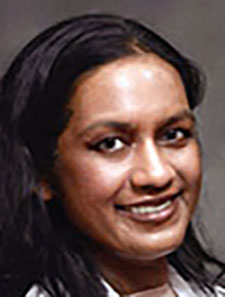
Dr. Dutta
Chair of medicine and associate professor of medicine at the University of Connecticut School of Medicine at Hartford Hospital in Hartford, Conn.
Dr. Dutta is a second-generation Indian American who grew up in the Buffalo, New York, area. Her parents came to the U.S. for a better life, and while they were not physicians, there was always a sense that becoming a physician was a noble profession and a career option associated with education and stability, she said.
Both at home and in her tight-knit South Asian community, there was a strong belief that anything was possible if you worked hard enough in the land of opportunity.
However, her mind was not made up until she went to India after college in the mid-1990s to work for Mother Teresa’s nonprofit, Missionaries of Charity. During this time, she was able to help provide care to the “poorest of the poor” in Kolkata and realized how fulfilling a career focused on healthcare and equity could be.
It also helped that one of her grandmothers was a physician, an obstetrician-gynecologist who was the first female physician in her Indian state. Learning about her grandmother’s trailblazing work was a strong influence on Dr. Dutta’s career path.
After college, Dr. Dutta spent time working on Capitol Hill in Washington, D.C., for the Senate Health Committee. Her time there led her to realize that many healthcare decisions at the national level were being made by others like herself—right out of college, with no previous experience in healthcare.
After medical school and residency, hospital medicine seemed to be a “perfect fit” to allow both direct provision of patient care and a focus on care delivery, both in a specific institution and the community surrounding it, Dr. Dutta said. This also meshed well with her cultural background, which traditionally had put the needs of the community over those over the individual.
“My parent’s vision of what a career as a physician looked like when I was young is probably vastly different from what I am doing now,” Dr. Dutta said. As a young physician leader, Dr. Dutta often was the only woman and/or South Asian in the room.
“Being a physician leader may not have been on AAPI individuals’ radars in the past, due to lack of representation or even awareness that these roles could be part of a career in medicine,” she said.
However, she has noticed over time that AAPI representation in hospital boardrooms has increased, though she notes there is still room for more AAPI practitioners at the table.
Dr. Dutta says that she has occasionally come across stereotypes about being a woman or being South Asian. She even had a patient recently who assumed her first language was not English. When it comes to these types of events, it’s important to acknowledge them and speak up, she says.
For AAPI individuals new to the field, Dr. Dutta emphasizes finding a mentor and being open to the various directions their career can go. She also advises young professionals to look at their background as an asset.
“My parents instilled in me a sense that I could do whatever I wanted if I put in the effort,” Dr. Dutta said. “I think that’s been a foundational belief for me throughout my career.”
Bryan Huang, MD, CHCQM-PhyAdv, FHM
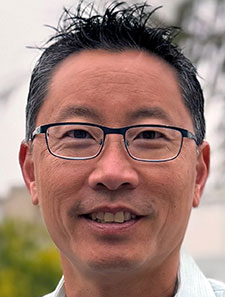
Dr. Huang
Clinical professor of medicine, and physician advisor for care management in the division of hospital medicine at UC San Diego Health at the University of California in San Diego
Dr. Huang, the son of Taiwanese immigrants who grew up in California, says that when his mother learned about the book “Battle Hymn of Tiger Mom,” she called herself a “dragon mom.” That shows his parents’ emphasis on working and studying hard.
“While I grew up in a beach town [Huntington Beach, Calif.], we hardly ever went to the beach. Daily life was focused on hard work rather than fun,” he said.
“During childhood, my parents used to tell my elementary school teachers that I would become a great doctor,” he said. “Fortunately, despite some pressure, my parents allowed me to discover my own career path.” Dr. Huang still ended up in the medical profession, although he did not have other medical professionals in the family.
The focus on a good work ethic and academic success paid off and propelled Dr. Huang to a top-ranking medical school and residency program, and subsequently to a career at UC San Diego Health as a hospitalist. He was associate division chief of hospital medicine at UC San Diego from 2010 to 2015 and subsequently was selected as one of the inaugural physician advisors and chair of the utilization review committee.
It wasn’t until his adult life that Dr. Huang began to discover passions outside of work like surfing and volleyball, which have led to a better balance of work and non-work life.
He says he’s grateful for the work ethic instilled in him by his family.
Dr. Huang has not faced much anti-Asian discrimination at work, although he did experience some negative sentiment outside of work during the COVID-19 pandemic.
“I am really pleased that UC San Diego has provided a supportive working environment that is welcoming to all. As an AAPI hospitalist, I’ve only encountered supportive, professional relationships with my colleagues and other staff,” he said.
Dr. Huang has observed a growth in AAPI representation in healthcare since his career in medicine began. “When I started at UC San Diego Health 19 years ago, there was only one Dr. Huang in our system—me—and no one knew how to pronounce my last name. Today, there are 20 Dr. Huangs in our system. Overall, I think there has been an increased representation of AAPI individuals in healthcare over the years,” he said.
He also has seen more AAPI hospitalists taking on leadership roles.
“In general, there is an increased recognition of our diverse patient and healthcare professional population and the background/talents each individual can bring to the table.” Dr. Huang said.
Brian Kwan, MD, FACP, SFHM
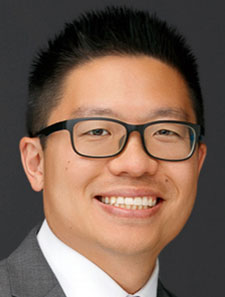
Dr. Kwan
Internal medicine clerkship co-director, president-elect of Clerkship Directors in Internal Medicine, and health sciences professor at UC San Diego, and hospitalist at the Department of Veterans Affairs Medical Center in San Diego
Dr. Kwan is a second-generation Cantonese Chinese American and was born and raised in Monterey Park, Calif., a predominantly Asian and Latino suburb in east Los Angeles. His father worked as an electrical engineer, and his mother was a postpartum nurse at a local hospital.
Dr. Kwan volunteered at his mother’s hospital, leading to his first exposure to health care settings. That eventually led him to apply to and attend the seven-year honors program in medical education at Northwestern University in Chicago.
“My parents immigrated from Hong Kong and sacrificed a lot in order to put me through educational experiences, such as private high school,” he said. “In particular, my dad would often spend extra time tutoring me after school on physics and mathematics. He is one of my biggest role models for being an effective teacher, which has shaped my current focus in medical education.”
One challenge Dr. Kwan has faced as an AAPI individual is being labeled by his exterior appearance. It was common during clinical clerkships to get labeled as the “shy” student when in reality, he just prefers to listen before speaking.
“This behavior can have a huge impact on subjective workplace-based assessments or how people perceive you in the work setting in general,” he said.
A mentor offered the strategy of trying to talk more frequently than the other students to be perceived as being engaged. It improved his grades.
“Over time, I have made a concerted effort to push myself out of my comfort zone, but I have also learned to embrace my strengths as an introvert and foster effective collaborative groups by giving space for others to participate,” he said.
Dr. Kwan says that the emphasis on relationships taught to him throughout his life has shaped his career and has helped him prioritize spending time with his wife, twin daughters, and pit bull. He also values friendships formed through organizations like SHM and the Alliance for Academic Internal Medicine.
“I value contribution and service to professional organizations, which have really accelerated my career development,” said Dr. Kwan, who recently chaired the SHM’s Physicians-in-Training Committee.
He also feels fortunate to have found a career he loves. “Don’t tell my bosses, but sometimes I think, ‘I can’t believe I’m getting paid to do this’ because truly, one of the root desires of being human is to feel like we are making a difference in the world,” he said.
Dr. Kwan would like to see more AAPI male representation in higher education or administrative leadership.
“Perhaps some of this discrepancy is related to narratives of overrepresentation of AAPIs in our field and also perceptions of AAPI success as the ‘model minority,’” he said. “Finding AAPI mentors in my space has required me to step outside my institution, and seeing these successful mentors really shine in their roles has helped me to shed the imposter syndrome that I sometimes feel as a leader in the medical education space.”
Dr. Kwan encourages young medical professionals, including AAPI individuals, still to consider the value of a health career. “Medicine, in spite of all its challenges, is still an incredible space where one can align professional interests with personal values,” he said.
Vivian Lee, MD
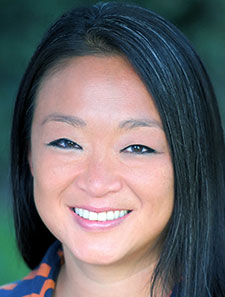
Dr. Lee
Co-director of quality improvement and patient safety in the division of hospital medicine at Children’s Hospital in Los Angeles and clinical associate professor of pediatrics at the University of Southern California Keck School of Medicine in Los Angeles
Both of Dr. Lee’s parents grew up in Taipei, Taiwan, and they came to the U.S. in the late 1970s for post-graduate training. Her mother was a pediatrician in private practice.
Dr. Lee grew up in coastal suburban San Diego with some Asian Americans but mostly in a white community. “This environment shaped my early experiences, influencing how I viewed myself and often leading me to rely on assimilation as I navigated my personal life, education, and early career,” she said.
Although Dr. Lee did not feel pressure to pursue a career in medicine, she credits her mother’s career for exposing her to the field. “She passed away in 2011 as I was finishing my first year of hospital medicine fellowship, but her values continue to guide me both personally and professionally—including questioning the why behind our behavior, maintaining curiosity and humility, and honoring a commitment to be and do good for others,” she said.
Dr. Lee says that she felt a need early in her career to seek individuality separate from her heritage. That led her to assimilate often into the dominant culture instead of being boxed into stereotypes (or her perceptions of them). That’s now changed.
“Over time, I’ve come to realize the importance of embracing my identity and all the different ways being from an Asian American immigrant family has built and enriched it, rather than distancing from it,” Dr. Lee said. “Now, as a mid-career hospitalist and leader, I hope to be a visible representation of Asian American women in medicine—not just for my own career satisfaction, but to empower others.”
Dr. Lee was the inaugural pediatric hospital medicine fellow in 2010 at Children’s Hospital in Los Angeles. She went on to discover work in quality and value improvement, leading her to oversee quality-improvement efforts within her division. She says that taking on leadership roles is important, as there is not as much AAPI representation in leadership as there could or should be.
Dr. Lee advises young AAPI professionals to take pride in their heritage and seek out those who understand their perspectives. “Medicine needs diverse perspectives, and by showing up authentically, you help provide better patient-centered and culturally competent care and pave the way for future generations who will do the same,” she said.
Jenny Y. Shen, MD, FHM
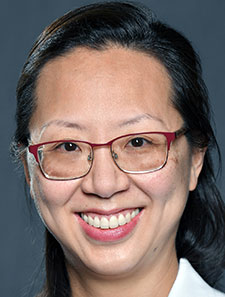
Dr. Shen
Associate professor of medicine and clinical nursing, medical director of the geriatric fracture center, and director of surgical co-management services in the department of internal medicine’s division of hospital medicine at Strong Memorial Hospital in Rochester, N.Y.
Dr. Shen grew up in Taiwan and came to New York City as a high-school junior. She then completed her medical education in western New York. Dr. Shen is currently an academic hospitalist with a special focus on geriatric perioperative care.
She says that she grew up with the stereotypical family pressure for academic excellence. “It took me some time during college for soul searching and self-reflection to figure out the path of what I want versus what the family wants,” she said.
Dr. Shen sometimes fields questions from patients such as, “Where are you from?” or “How long have you been here?” However, she tries to assume benign intentions and have a conversation with them.
She encourages young AAPI professionals entering medicine to see their heritage in a positive light.
“Our past lived experience as immigrants or children of immigrants is a tool and asset to help better serve our patients,” she said. “There will always be people out there making us feel the ‘otherness,’ but finding a way to deal with it and knowing our own worth helps.”
Lucy Shi, MD
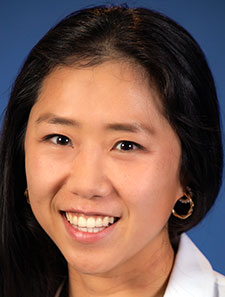
Dr. Shi
Assistant professor and director of student-run clinics at University of California Davis School of Medicine in Sacramento, Calif., and member of The Hospitalist’s editorial board
Dr. Shi grew up as the oldest child of two Chinese immigrants and struggled to connect with her parents.
“My parents were those typical strict Chinese parents with what felt like a narrow view of success. Looking back, I can see that my parents and probably many other immigrant families focus heavily on education because it was how they were able to immigrate to the United States,” she said. “It’s also an area where my parents weren’t judged by their appearance or accents, and there were ‘right’ or ‘wrong’ answers on tests. They really pushed me to focus on education, and this mindset still influences me today.”
She believes that background is most likely why she chose to study hospital medicine, with its wide variety of patients and the breadth of experiences you can have as you continue to learn.
With her family’s emphasis on community service, Dr. Shi decided to volunteer with the student-run clinics affiliated with UC Davis when she began as a hospitalist. She continues to work at those clinics and recently became director of them. “It’s led to a lot more reflection on how my parents, as immigrants with strong accents, have felt disconnected and not represented in spaces they’ve been in,” she said. Many of the patients who choose to seek care at student-run clinics are in this same position, she observes.
Although Dr. Shi sees Asian Americans as a whole as well represented within medicine, she observes that there are still many smaller Asian and Pacific Islander groups that remain under-represented.
She also sees fewer Asian Americans in leadership positions, especially among women. “I think some of the gaps come from cultural differences where there may be a disconnect in skills and values that don’t quite fit the traditional U.S. prototype of what leadership means. It’s been helpful for me to surround myself with a supportive community at work and mentors who not only support but uplift and reaffirm your value,” Dr. Shi said.
Dr. Shi is proud that multiple AAPI medical students have reached out to her for mentorship and support. She encourages them to consider their cultural background and values as strengths to highlight rather than trying to fit within the traditional mold of success.
“For anyone going into medicine, but especially for anyone who feels or looks different than the traditional norm, I can’t overemphasize the importance of finding mentors and a community that makes you feel seen and valued,” she said.
Dr. Shi appreciates the goals of AAPI Heritage Month but also thinks “AAPI” is an umbrella term that doesn’t quite capture the diversity of ethnicities, languages, and cultures represented.
“Each group faces their own challenges and disparities, and it’s important to remember and hear those individual voices,” she said.
Evan Symons, DO, pediatric hospital medicine fellow
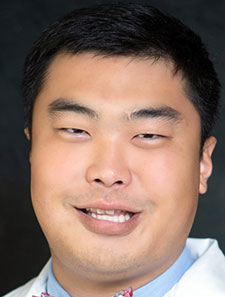
Dr. Symons
Former chief resident in internal medicine at the VA Medical Center, current resident (PGY7) in internal medicine-pediatrics at the University of Nebraska Medical Center, all in Omaha, Neb.
Although Dr. Symons was born in Seoul, South Korea, he was adopted when he was three months old.
Dr. Symons grew up in the small town of Decorah, Iowa. He was “Americanized” in many ways, but his adoptive parents had him take part in a summer camp called Korean Adoption Means Pride, or K.A.M.P., held each year in his state for Korean adoptees and their families.
“Growing up in small-town Iowa, I could appreciate that I was different than the majority of my friends or classmates, but Decorah was a very welcoming community,” Dr. Symons said.
As a Korean adoptee, he felt a drive to prove his value to the world.
Yet growing up adopted also has helped him better appreciate the value that each person brings—something he says most hospitalists likely acknowledge, but that came to him specifically because of his adoptive background. “I think it affects how I practice medicine by trying to do as many things as we can for our patients so that they can live the lives they wish to, which can be frustrating with the healthcare system we work in,” he said.
Dr. Symons initially studied engineering as an undergraduate but switched to medicine to have a career with more interpersonal contact. “This is where I felt my calling to be able to care and advocate for my patients in these stressful and difficult times,” he said.
He did an internal medicine-pediatrics residency at the University of Nebraska Medical Center and then was chief resident for the internal medicine program at the VA Medical Center, both in Omaha, Neb. He is currently finishing his pediatric hospital medicine fellowship at Children’s Nebraska in Omaha and plans to stay on as a med-peds hospitalist for the University of Nebraska Medical Center and its affiliated hospital, Children’s Nebraska.
Dr. Symons says that he encountered some bias during the COVID-19 pandemic.
“Early in the pandemic, it was not uncommon for patients to see me, hear me cough to clear my throat, and ask if I have COVID-19, followed by asking where I was from. I always would say ‘Iowa,’ but nine times out of 10, I would get asked again where I was really from. I would tell them I was born in Korea but grew up in Iowa for the large majority of my life. This was also not uncommon pre-pandemic either,” he said. “I’ve had patients tell me that I ‘speak English good’ on multiple occasions.”
Although these incidences are frustrating, he says it’s important to allow grace while being able to verbalize or identify the bias that may exist.
“Depending on the situation, it is also important to have times to debrief with the people involved to allow for a safe space to discuss the events and what we each can improve on,” he said.
Dr. Symons says he has a desire to learn even more about his South Korean background but has also taken part during his fellowship in a two-year Spanish immersion class. At the time of our interview, he was planning to travel to Mexico in March. That stems from his appreciation of how different a healthcare encounter can be for a non-English-speaking patient.
Dr. Symons encourages other young AAPI professionals to find something within medicine that excites them but also to find an activity or hobby outside of the field. “Medicine is hard, and doing life in general is hard. It’s important to have something you can go to after a difficult day,” he said.
He also advises speaking up if you see or experience a biased encounter.
Vanessa Caceres is a medical writer in Bradenton, Fla.